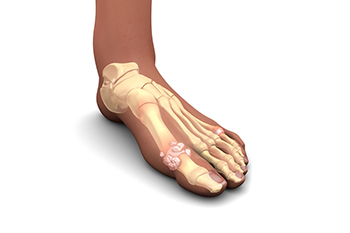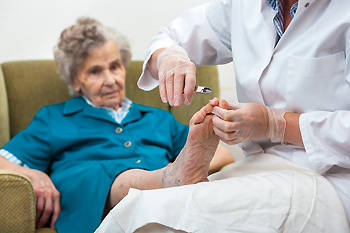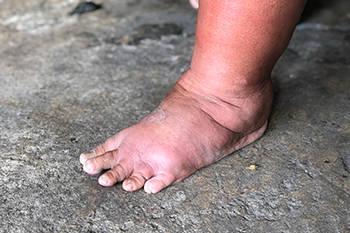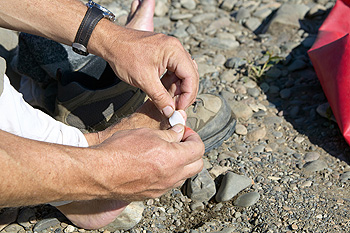Items filtered by date: December 2022
Causes of Gout

The common symptoms that many people experience with the foot condition that is known as gout is debilitating pain, swelling, and the affected toe may be red. It is an ailment that affects the joints in the big toe and happens from excess uric acid in the blood. This may happen from genetic reasons or from eating foods that have high amounts of purines. These can include red meat, excess alcohol, shellfish, and drinks that are made with large amounts of sugar. The pain comes from crystals that form in the joints of the big toe and can affect completing daily activities. Ultimately, frequent gout attacks may damage the kidneys, bones, and joints, and it is suggested that a healthy diet and exercise program is implemented. This may be helpful in avoiding future painful bouts with gout. A podiatrist can provide treatment to people who have gout, in addition to discussing effective prevention methods. Please contact a podiatrist for the relief and information you are seeking.
Gout is a painful condition that can be treated. If you are seeking treatment, contact one of our podiatrists from Parkwood Podiatry. Our doctors will treat your foot and ankle needs.
What Is Gout?
Gout is a form of arthritis that is characterized by sudden, severe attacks of pain, redness, and tenderness in the joints. The condition usually affects the joint at the base of the big toe. A gout attack can occur at any random time, such as the middle of the night while you are asleep.
Symptoms
- Intense Joint Pain - Usually around the large joint of your big toe, and it most severe within the first four to twelve hours
- Lingering Discomfort - Joint discomfort may last from a few days to a few weeks
- Inflammation and Redness -Affected joints may become swollen, tender, warm and red
- Limited Range of Motion - May experience a decrease in joint mobility
Risk Factors
- Genetics - If family members have gout, you’re more likely to have it
- Medications - Diuretic medications can raise uric acid levels
- Gender/Age - Gout is more common in men until the age of 60. It is believed that estrogen protects women until that point
- Diet - Eating red meat and shellfish increases your risk
- Alcohol - Having more than two alcoholic drinks per day increases your risk
- Obesity - Obese people are at a higher risk for gout
Prior to visiting your podiatrist to receive treatment for gout, there are a few things you should do beforehand. If you have gout you should write down your symptoms--including when they started and how often you experience them, important medical information you may have, and any questions you may have. Writing down these three things will help your podiatrist in assessing your specific situation so that he or she may provide the best route of treatment for you.
If you have any questions, please feel free to contact our offices located in Brunswick and Hinesville, GA . We offer the newest diagnostic and treatment technologies for all your foot care needs.
Gout Pain Can Be Managed
Why Is Foot Health Important for Seniors?

Typically, certain individuals might have to take extra care in maintaining the health of their feet because they might be particularly susceptible to enduring afflictions of the feet. For example, individuals who suffer from diabetes are at an increased risk of developing conditions that negatively impact the feet. Additionally, senior citizens ought to be very diligent about protecting the health of their feet. There are a number of reasons for this. Notably, as an individual ages, the muscles in the feet might decrease in strength and vitality. As a result, the senior might have difficulty engaging in weight bearing activities. They might also experience a balance problems. This can make suffering falls or tumbles more likely. If you are a senior citizen that is experiencing foot problems, it is recommended that you reach out to a podiatrist. This foot specialist will be able to tailor their advice to you and help you address any foot problems you might have.
Proper foot care is something many older adults forget to consider. If you have any concerns about your feet and ankles, contact one of our podiatrists from Parkwood Podiatry. Our doctors can provide the care you need to keep you pain-free and on your feet.
The Elderly and Their Feet
As we age we start to notice many changes in our body, but the elder population may not notice them right away. Medical conditions may prevent the elderly to take notice of their foot health right away. Poor vision is a lead contributor to not taking action for the elderly.
Common Conditions
- Neuropathy – can reduce feeling in the feet and can hide many life-threatening medical conditions.
- Reduced flexibility – prevents the ability of proper toenail trimming, and foot cleaning. If left untreated, it may lead to further medical issues.
- Foot sores – amongst the older population can be serious before they are discovered. Some of the problematic conditions they may face are:
- Gouging toenails affecting nearby toe
- Shoes that don’t fit properly
- Pressure sores
- Loss of circulation in legs & feet
- Edema & swelling of feet and ankles
Susceptible Infections
Diabetes and poor circulation can cause general loss of sensitivity over the years, turning a simple cut into a serious issue.
If you have any questions please feel free to contact our offices located in Brunswick and Hinesville, GA . We offer the newest diagnostic and treatment technologies for all your foot and ankle needs.
Swelling as a Symptom

Swelling of any part of the body can sometimes be a clear symptom of some kind of greater problem. It might also be indicative of some kind of injury. Swelling in the feet can operate in a similar kind of way. Sometimes when an individual sprains their foot, for example, swelling can occur as a result. Swelling and bruising can often go together when they are symptoms of a foot sprain. When the feet have become swollen because of a foot sprain, one might try to remedy this problem by essentially elevating the feet. Keeping the feet raised might help in keeping the swelling down. If you want to learn more about swelling of the feet or are experiencing it yourself, contact a podiatrist today for more information.
Swollen feet can be a sign of an underlying condition. If you have any concerns, contact one of our podiatrists of Parkwood Podiatry. Our doctors can provide the care you need to keep you pain-free and on your feet.
Swollen feet are a common ailment among pregnant women and people who stand or sit for extended periods. Aging may increase the possibility of swollen feet and patients who are obese often notice when their feet are swelling too. There may be medical reasons why swollen feet occur:
- Phlebitis - A condition that causes the veins to become inflamed and can also cause leg pain.
- Liver disease - This may lead to low blood levels of albumin which is a protein. This can cause fluid in the blood to pass into the tissues and several areas of the body can become swollen.
- Heart failure - When the heart doesn’t pump properly the blood that is normally pumped back to the heart can pool in the veins of the legs causing swollen feet.
- Kidney disease - One of the main functions of the kidneys is releasing excess fluid in the body. This type of condition can make it difficult for the kidneys to function properly, and as a result the feet may become swollen.
- Deep-vein thrombosis (DVT)- This is a serious condition where blood clots form in the veins of the legs. They can block the return of blood from the legs to the heart which may cause the feet to swell. It is important to be treated by a podiatrist if this condition is present.
Swollen feet can also be caused by bone and tendon conditions, including fractures, arthritis, and tendinitis. Additionally, there may be skin and toenail conditions and an infection may cause the feet to swell. Patients who take medicine to treat high blood pressure may be prone to getting swollen feet.
Many patients elevate their feet to help relieve the swelling and this is generally a temporary remedy. When a podiatrist is consulted the reason behind the swelling can be uncovered and subsequently treated.
If you have any questions please feel free to contact our offices located in Brunswick and Hinesville, GA . We offer the newest diagnostic tools and technology to treat your foot and ankle needs.
Causes and Complications of Foot Blisters

Blisters on the feet are pockets of fluid that form beneath the top layer of the skin to protect the lower layers from damage. Blisters on the toes, feet, or heels may be caused by friction, usually from pressure or rubbing against the inside of a shoe. Generally, a blister is filled with clear serum, but sometimes it may be filled with blood, or even pus if it becomes infected. As a rule, a blister will go away on its own in three to seven days. As new skin grows under the blister the serum will be reabsorbed into the body and the outer skin will dry up and flake off. However, it is important to remember that popping a blister can cause infection or inhibit the healing process. Wearing shoes that are comfortable and do not rub against the skin is a sure way of allowing a blister on the foot to heal, or preventing one from occurring in the first place. If you have a particularly painful blister, or one that appears to be infected, please make an appointment with a podiatrist. Antibiotics may be prescribed to ward off the infection, and the podiatrist may safely drain the blister in a sterile setting.
Blisters are prone to making everyday activities extremely uncomfortable. If your feet are hurting, contact one of our podiatrists of Parkwood Podiatry. Our doctors can provide the care you need to keep you pain-free and on your feet.
Foot Blisters
Foot blisters develop as a result of constantly wearing tight or ill-fitting footwear. This happens due to the constant rubbing from the shoe, which can often lead to pain.
What Are Foot Blisters?
A foot blister is a small fluid-filled pocket that forms on the upper-most layer of the skin. Blisters are filled with clear fluid and can lead to blood drainage or pus if the area becomes infected.
How Do Blisters Form?
Blisters on the feet are often the result of constant friction of skin and material, usually by shoe rubbing. Walking in sandals, boots, or shoes that don’t fit properly for long periods of time can result in a blister. Having consistent foot moisture and humidity can easily lead to blister formation.
Prevention & Treatment
It is important to properly care for the affected area in order to prevent infection and ease the pain. Do not lance the blister and use a Band-Aid to provide pain relief. Also, be sure to keep your feet dry and wear proper fitting shoes. If you see blood or pus in a blister, seek assistance from a podiatrist.
If you have any questions, please feel free to contact our offices located in Brunswick and Hinesville, GA . We offer the newest diagnostic and treatment technologies for all your foot care needs.

